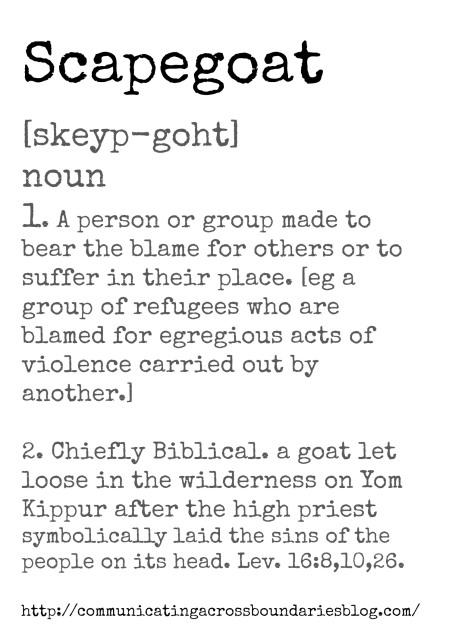
As humans, we have a deep need to find reasons for why bad things happen. We want to find those responsible and punish them so that the problem is solved. We want quick results and solutions. And in the process, it is our human tendency to cast blame, to find a scapegoat.
The world has wept at the tragedies of last week, and yet before the tears dried, a scapegoat had to be found. In the United States, the scapegoat is the refugee.
And so the real problem has been masked. Because the real problem is not the refugee. It is the violence that created the refugee. It is a war that left over 40 million refugees in its wake. It is a 1948 Nakba that caused an exodus of over 80% of Palestinians from olive groves and villages. It is a Bosnian war where 2.7 million people had to flee. It is a violent war in Darfur that left millions displaced. It is conflict in Colombia that gets no attention, even though millions have reportedly been displaced. It is an invasion that caused 4.7 million Iraqis to flee from their homes and livelihoods.
And now it is a conflict in Syria where numbers rise every day so that I constantly have to look up the numbers and shake my head in disbelief.
No – it is not the refugee. But like the goat let loose in the wilderness in Old Testament times, the refugee bears the sins of violence of others.
What’s to be done with a scapegoat?
Imagine that you and your family were victims of a violent robbery in your home. You lost everything that was precious to you, including a son who was caught in the crossfire and shot by one of the robbers. Your home was destroyed, and you are at the mercy of those around you. At first there is empathy – but then, people begin to talk. “They should have paid for an alarm system.” “They should have had a gun.”
“They made themselves vulnerable to that attack.” “They should have family that help them.” And so people back away, and instead of offering support, they are suspicious. The insurance company tells you that the repairs and claims will take months to process. You have suddenly become a displaced person, and you are being blamed for being displaced.
I’ve read that in Ancient Greece, during times of war or disaster, a beggar or a cripple was thrown out of the community. It was scapegoating, blaming the innocent in order to make everything okay. I read that and I think “How sad that the community believed that the tragedy would be averted? How sad that they thought this would make everything okay.”
Indeed – how sad. How very sad. Why didn’t they know better?
- What Happened to History’s Refugees?
- Refugee Facts and Resources
- Welcoming the Refugee- Choosing to Walk Away from Fear

